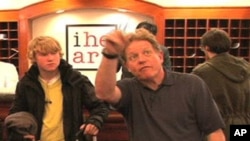Tens of thousands of people attended a rally in Washington in October that was organized by two comedy show hosts to poke fun at the political process. The huge attendance demonstrated the broad influence that political satire has in the United States. But it has also stirred debate over whether comedians help or hinder the democratic process.
Jimmy Tingle is a stand-up comic, who has been featured on top news and comedy shows in the United States. During a recent visit to New York, he went out onto busy Lexington Avenue in Manhattan to illustrate a few of his funny ideas. "One of the things I'm trying to do as a comedian is come up with ideas that can actually help society. Thus, I would like to introduce you to the Jimmy Tingle alternative Energy Plan," he said.
Tingle's satirical proposals range from putting windmills on top of traffic lights to introducing Chinese-style rickshaws as a key mode of transport in American cities. "How many times has a person come up to you and said, 'I jogged nine miles today.' Good. Pull somebody with you!," he said.
Tingle, who is from Boston, Massachusetts, belongs to a nationwide cast of comedians who make fun of politics and politicians. It is not a new phenomenon of course. But, what is new in America is that politicians and the public take them seriously.
Jon Stewart, who hosts a half-hour satirical news show that pokes fun at politicians and media outlets recently got President Barack Obama to appear on his show, which is widely popular with a younger audience that is disenchanted with mainstream news.
Fans of Jon Stewart and another satirical news show host, Stephen Colbert, came from across the country to Washington for a rally they staged ahead of the November congressional elections in which President Obama's Democratic Party lost control of the House of Representatives.
Young Americans increasingly say they get their news mainly (from) late night comedy shows such as The Daily Show with Jon Stewart and The Colbert Report. And comedy shows such as these have multiplied on cable TV in recent years. In an interview in his hotel room, Tingle says that is because comedy is such a powerful tool for criticism. "I think the parameters of comedy are so much broader, the boundaries, you can talk about anything," he said.
Satiric TV shows have their critics, who say they are trivializing serious issues and fueling public cynicism about the political process. Supporters say they foster interest in the issues among people who might otherwise be apathetic.
Tingle says people should not think that comedy shows can give them all their news. But, he says, they can help viewers understand the world around them. "It is really about getting at the kernel of truth that gets a visceral reaction in people, that makes them laugh. So they are distilling all that information out there and that is what they are presenting. So even in that respect, you are getting a distilled version of pretty profound truths," he said.
Tingle says his humor is aimed at making people think about issues that he cares about. One is elections. Tingle says the negative TV ads that American candidates use to tarnish their rivals' reputation could make anyone look bad. He does a mock version of such an ad. "You've got that grainy, black-and-white footage, the ominous voiceover: 'He gives comfort to illegal aliens, has defended accused criminals," he said. "At a time of rising terror, he opposes war. At a time of rising crime, he opposes the death penalty. Jesus Christ, bleeding heart liberal!"
Tingle's seriousness about politics led him to study at one of the most prestigious schools for public administration, Harvard University's Kennedy School.
Last spring, he got his degree and gave the commencement speech. "Woody Allen had a great line. As a filmmaker, he said, 'If I make people laugh, that's great. If I make them laugh and think, that's really, really great. But if I just make them think, I'm in trouble.'"






